#world literature
Text
As a Thanatos devotee, I normally tend to hate the story of Sisyphus. I however usually see the Greek tales as metaphors for how the Greeks saw elements of the world interact with any other. Finally I decided to put some thought into the tale of Sisyphus, and finally I understood. Sisyphus hid death from the world, and his punishment was the torture of repetition. It’s a metaphor for how valuable death, Thanatos, is for us. Ares freeing Thanatos was a metaphor for how without Death there is no glory or passion in life. Without Death, or change, we are all suffering in stagnant repetition.
#hellenic pagan#hellenic deities#hellenic gods#hellenism#hellenic polytheism#greek mythology#sisyphus#world literature#greek gods#hellenic polythiest#thanatos#thanatos devotion#Thanatos devotee
191 notes
·
View notes
Text
I feel as if I had been in the world a thousand years, and I trail my life behind me like an endless scarf.
Anton Chekhov, from The Seagull, 1895
#anton chekhov#the seagull#russian literature#play#literary text#books and libraries#world literature#quotes#dark acadamia aesthetic#classic literature#spilled ink#existentialism#dark academia
527 notes
·
View notes
Text
I’ve been a translator from Catalan for almost fourteen years, and something that never fails to astonish me is the vibrancy of the Catalan literary tradition. Whether a re-discovered classic or a startling young author from the near-constant flurry of innovative writing, there are always new voices to be unearthed, and the time-worn phrase “embarrassment of riches” comes to mind.
[...]
It’s this commitment in Wilder Winds to unflinching honesty and genuine emotion that is shared by the books on this list. Whether it be the realities or war, anarchism or autism, these voices offer the reader an intimate glimpse into other lives that never feel distant from our own. I’ve chosen eight books that demonstrate the richness of Catalan literature over the last century or so, but there are literally dozens more I could have chosen. Think of what follows, then, as less of a reading list and more of an amuse-bouche to whet your reading appetite for Catalan literature in English.
Are you interested in reading Catalan books that have been translated to English? Read this article to find 8 books that the translator Laura McGloughlin recommends (mostly novels, some short story books, and one poetry book).
#literatura#arts#literature#catalan#catalan literature#world literature#books#bookblr#bel olid#joan maragall#joan sales#incerta glòria#uncertain glory#rosa maria arquimbau#forty lost years#mercè rodoreda#death in spring#quim monzó#alicia kopf#brother in ice#eva baltasar#permafrost#wilder winds
98 notes
·
View notes
Text

#jules verne#illustration#ocean#sea#20000 leagues under the sea#world literature#deep sea#ocean wildlife#sea creatures#sea life
22 notes
·
View notes
Photo

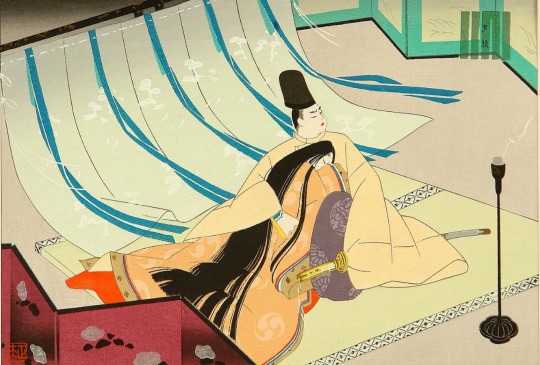

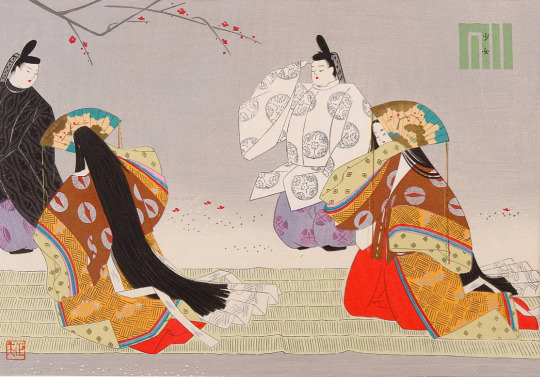
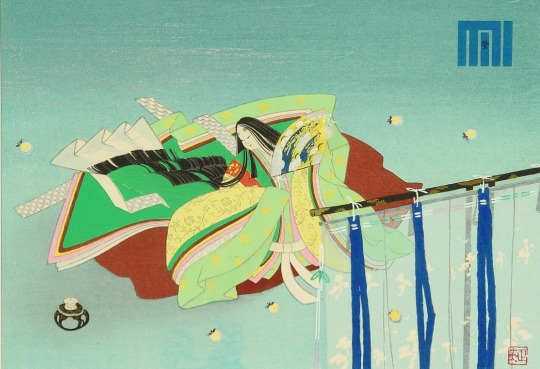

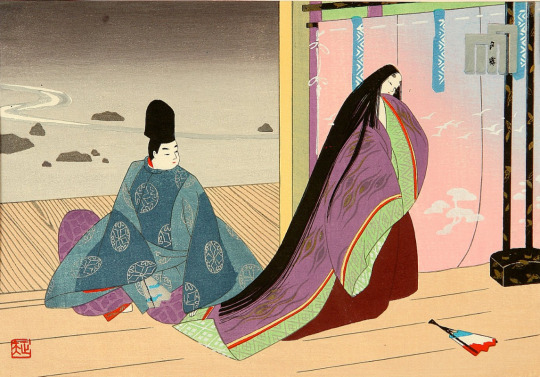


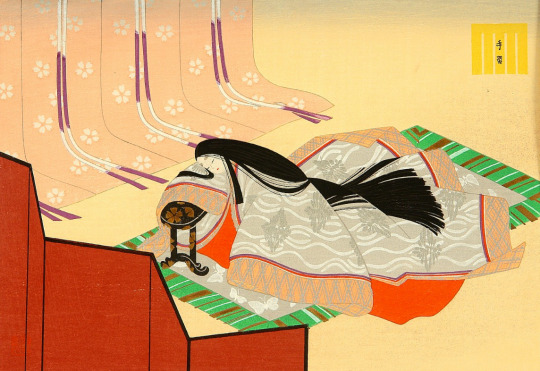
Scenes from “The Tale of Genji” - beautifully illustrated by Maeda Masao, ca. 1950
(click on image to see the chapters and characters depicted)
#the tale of genji#genji monogatari#murasaki shikibu#heian#era#period#japanese#history#literature#world literature#classics#illustration#illustrations#ukiyoe#fashion history
407 notes
·
View notes
Text

English literature is literally what my degree is in, so that's my literary affinity! Where do you fall in national lit affinities?
At some point I've gotta make a version of this that is a little less white, western, and male...Comment if your literary affinity doesn't fall into this very limited meme and tell us your favorite!
#literature#books and literature#world literature#british literature#american literature#french literature#russian literature#literary memes
59 notes
·
View notes
Text
I’m reading the Epic of Gilgamesh for World Lit and there is no straight explanation for any of this
“You will fall in love with him and caress him like a woman”
I’m sorry?????? If anyone looks at me and tries to convince me this is straight I’m going to laugh in their face.
#gilgamesh#the epic of gilgamesh#world literature#queer lit#gay literature#NO ONE TOLD ME THIS WAS GAY
13 notes
·
View notes
Text


February 21, 2024 °Wednesday
Salaam, I hope everyone is doing well! Today, I decided to have a mid-week refresh. This semester has proven to be more challenging than last semester, but I am pushing through!
Made my bed (this is a real accomplishment after a two-week streak of not)
Cleaned the shared bathroom
Did my laundry
Studied for 1.5 hours (attended lectures for 3)
Did some psychology homework
Finished Clear Light of Day by Anita Desai for my world literature class
Add me as a friend on Storygraph if you have it! I’d love to see your reads <3
#studyblr#muslim studyblr#new studyblr#psychology#world literature#uniblr#☕️ — laikastudies#ilyastudies
11 notes
·
View notes
Text

Märchen aus Tausend und Einer Nacht, 1890
#1001 nights#oriental literature#oriental heritage#tales of 1001 nights#antiquarian book#world literature#book cover#bookworm#19th century#book#literature#antiquarian
14 notes
·
View notes
Text
a comparison of themes
a brief comparison of the shared/juxtaposed themes between the works "the stranger" by albert camus, "no longer human" by osamu dazai, and "notes from the underground" by fyodor dostoevsky
(will try to keep this spoiler-free as possible!)
opening notes:
themes:
alienation, apathy and envy, misanthropy and understanding others, pride versus conformity
main characters
meursault from "the stranger"
yozo from "no longer human"
underground man from "notes from the underground"
premise
meursault is a man who lives in french algeria. his initial characterization is established when his mother dies, and he doesn't care much. later on, he happens to commit a crime, and we are shown his detached nature throughout the legal/penal process
yozo deems himself "disqualified as a human being" while examining his life; he finds himself unable to understand other people and is frightened by their strange emotions and behaviors while he spirals in and out of addiction and depression
the underground man is a spiteful loner who drives away the people around him and favors his own fantasies over his real life; he chooses to indulge in his romanticized, emotionally charged perspective, which in turn causes him more pain
alienation:
-- all three main characters are shown to be outcasts, unable to participate "properly" in society. in a narrative sense, all three end up "punished" by society for being different (either literally or as they perceive)
-- all three characters try to form romantic relationships, only to be thwarted at some point (note: meursault was arguably most successful). in each case, their prospective partners were interested, only to leave them under circumstances that all arguablely stemmed from the protagonist's actions.
apathy:
-- meursault is apathetic towards his uncaring nature in-of-itself. he is not bothered by his apparent loneliness and callousness, nor how other people perceive him. in fact, he barely sees himself as different, unlike our other two protagonists
-- meanwhile, the underground man tries hard to appear "cool" and unaffected by what he sees as slights upon his honor, but he ends up raging anyway; he envies the status, wealth, and social connections that other people have and emulates those in his fantasies
-- on the other hand, yozo is painfully affected by everything around him and overthinks every action both he and other people make. he determines himself as thoroughly unable to be human
misanthropy and understanding others:
-- the underground man and yozo find themselves disturbed and perplexed by other's actions. both distrust others, believing society to be maliciously out to get them. they're ultimately hindered by this self-consciousness.
-- yozo tried hard to "fit in" to the expectations around him, only to deviate more as he cracked under pressure
-- the underground man tried a few times to be sociable but ultimately gave up and declared himself a member of the "underground", retreating into his own world
-- opposing this is meursault, who is seen as the frightening, perplexing being by other people due to his apparent lack of emotion by the end of the book. however, before the climatic incident of the novel, he was seen as an ordinary, albeit bland, man who just goes through his life. he never tried "too hard" to fit in, even though through his narration, we can tell that he was already apathetic, to begin with. the incident merely called everyone's attention to him
pride versus conformity:
-- ultimately, all three men chose pride, consciously or not. they refused (or were not able) to become molded to society's standards, and all chose the "wrong" path in the end, even though they tried to live "normally" at some point
-- they stayed true to their nature (as outlined above) to the end of their respective novels. each novel resolved with a respective resignation/acceptance of their fates
#literature#books#world literature#character analysis#theme analysis#literary analysis#reading#the stranger#albert camus#no longer human#dazai osamu#notes from the underground#fyodor dostoevsky#book comparison#i love reading#its so fun drawing parallels#i did this instead of working so now you gotta read it#so yeah no poems today#just me gushing over famous books#hope it all makes sense#feel free to correct me#or debate me
10 notes
·
View notes
Text
Anything, anything would be better than this agony of mind, this creeping pain that gnaws and fumbles and caresses one and never hurts quite enough.
Jean-Paul Sartre, No Exit, 1944
#jean paul sartre#no exit#agony#existentialism#literary text#books and libraries#world literature#quotes#dark acadamia aesthetic#classic literature#anguish#translated literature
553 notes
·
View notes
Text
The 13th of January is a sad day in Valencian literature. It's the anniversary of the death of two of the greatest modern writers: Isabel-Clara Simó (1943-2020) and Enric Valor (1911-2000).
In this video (posted by À Punt), you can see two fragments of interviews with them, where they talk about the importance of the language in their work. I have added subtitles in English. The transcription is under the cut.
(Note: "Valencian" and "Catalan" are two names for the same language. Both terms are being used interchangeably.)
Enric Valor: to teach for 300 years in another language and to not lose nor alter deeply our language is a real miracle. For this reason, all the European philology is marveled of the Valencian people. Without knowing why, for tradition, for love of your family, to be like your parents, to speak like your parents, all of a person's memories manifested through that language- and we have preserved it in such a rich way that there was no danger of being irreparable.
Isabel-Clara Simó: I have always written, all my life. I used to write only in Spanish because I didn't know that written Valencian existed. Joan Fuster and his group taught me it, in València. And the first time that I tried to write a story -full of spelling mistakes- in Catalan, I started crying. Because it was the first time that I was writing in the language that I think in.
#literatura#arts#enric valor#isabel-clara simó#valencià#català#languages#langblr#translation#books#bookblr#literature#world literature#minority languages#20th century literature
100 notes
·
View notes
Text
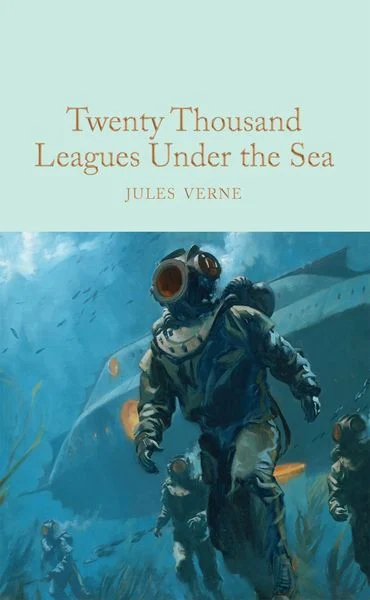
#book#books#book cover#literature#jules verne#20000 leagues under the sea#sea#ocean#world literature
8 notes
·
View notes
Text

#literature memes#world literature#italian literature#the divine comedy#dante's divine comedy#dante's inferno#the inferno#literature shitpost#we are not the same#dante alighieri#classic literature#classic lit memes#ersh lit post
46 notes
·
View notes
Text
Today is International Translation Day
The United Nations General Assembly passed a resolution to observe September 30 as International Translation Day because it happens to be the feast day of the translator of the Bible, St. Jerome, who died in 420 AD.
Reading translated literature doesn't just mean reading books that have been translated into our native language. It means gaining access to the stories, culture, traditions, lands, philosophies, politics, and methods of storytelling from far-flung nations.
It allows us to see mountains and rivers far from our own; to meet people with different backgrounds and experiences; to understand the arts and histories of places we’ve never seen.
It us feel connected to the the world as one people with the same worries and concerns, and the same joys and resiliance. In a world facing global crisis that will require a united humanity to resolve, translated works enables the empathy that we will need to come together.
I am celelebrating International Translation Day by sharing a few of my favorite translated books. Feel free to share yours.
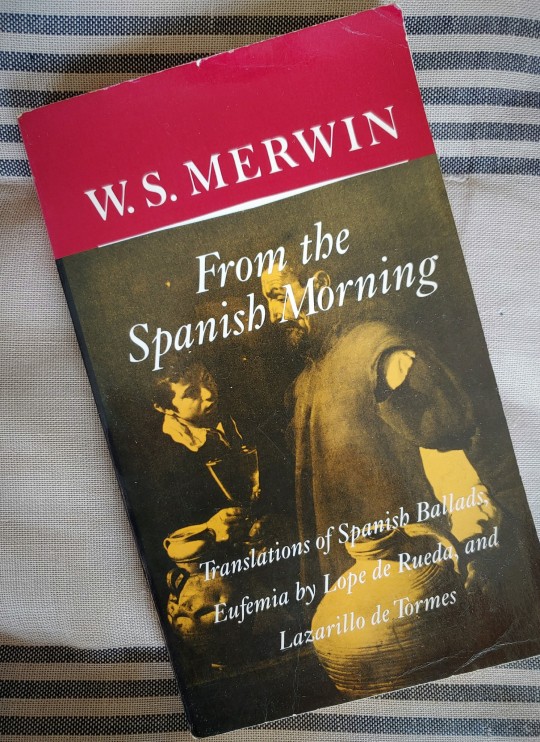
W S Merwin is an American poet laureate but I have always like him more as a translator. As a poet himself he has a unique authority that allows him to cut to the meat of a poem by discarding anything that gets in the way of the authors intent. From a Spanish Morning is wonderful collection of 15th to 17th century Spanish poetry and prose.
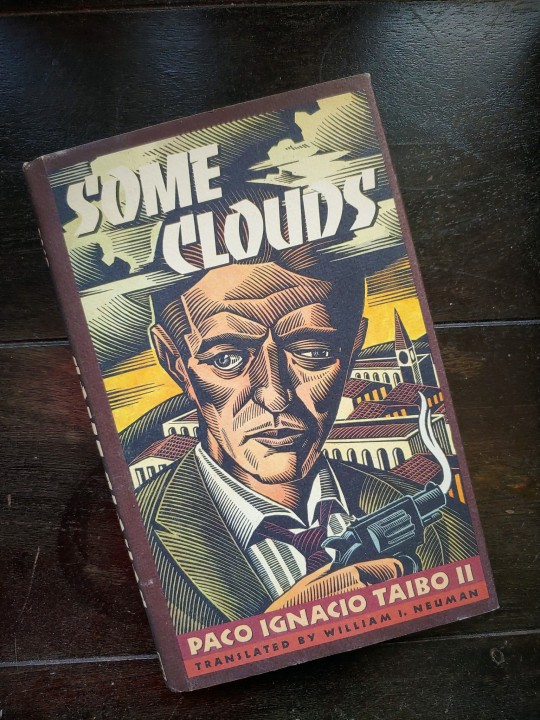
Paco Ignacio Taibo II is a Mexican writer whose private eye Héctor Belascoáran Shayne is one of my favorite gumshoes and the subject of a Spanish language tv show on Netflix. Some Clouds,translated with great pace and humor by William Neuman, is my favorite book in his series. Its great Mexican Noir with a Cohen Brothers vibe.
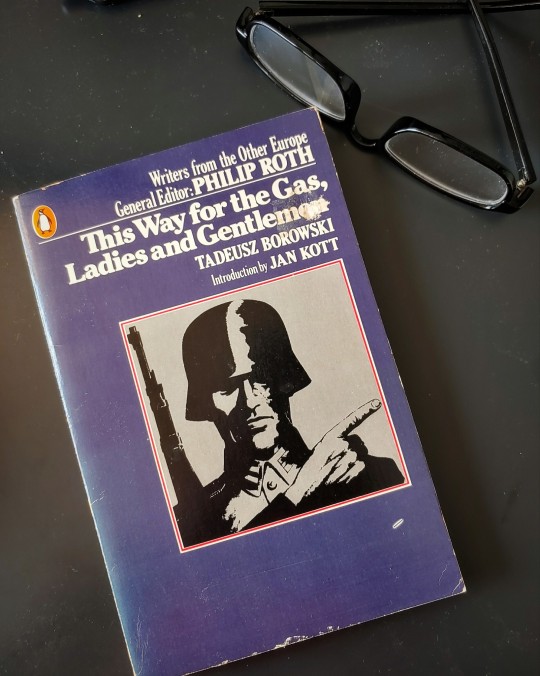
Philip Roth's Writers From Other Europe series from Penguin was a great publishing project in the 70s. The series introduced me to Milan Kundera and Geza Csath, writers that are in my wheel house and I would have likely found anyway but what was so innovative about this was that by presenting the books as a series rather than individual authors I also read titles I likely would never have exposed myself to on my own. I am not a WWII fan and generally gravitate other topics but picked up Tadeuz Borowski's This Way to the Gas, Ladies and Gentlemen because it was the next book in Roth's series and I had loved everything so far. Wow. In the words of translator Barbara Vedder, "Despite the deceptive simplicity of his style and of his documentary technique, his writing carries a burden of meaning that far transcends the mearly actual."
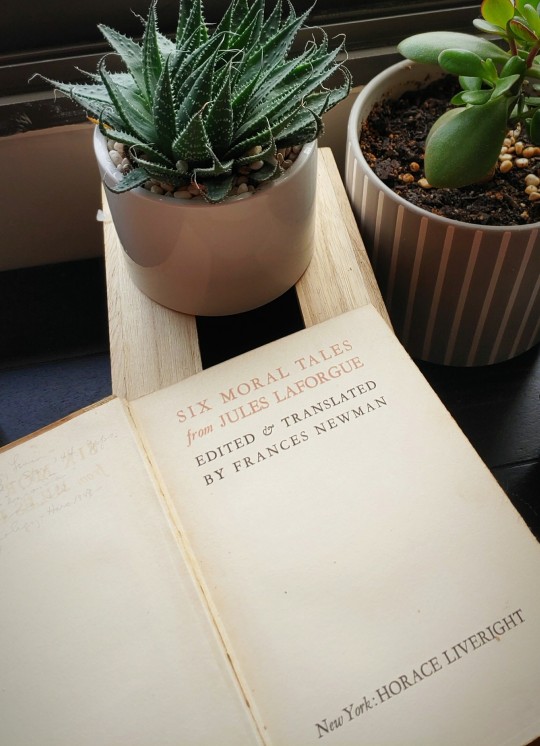
Jules Laforgue was a French-Uruguayan symbolist poet and writer. The New York Times described Laforgue's Moral Tales as thus, "Mallarme defined the author of these ‘Moral Tales’ as the Voltaire of Symbolism - a demystifier of the cultural bric-a-brac of the bourgeoisie, a dandyish demolition expert specializing in disenchantment. According to Ezra Pound (who translated one of these stories in 1918), Laforgue had delivered the coup de grace to the facile exoticism (and eroticism) of the 19th-century historical novel; in clearing out the residual rubbish of romanticism, he had prepared the way for modernist prose."
This translator of this 1928 Liveright edition is no less interesting. Novelist in her own right, Frances Newman challenged the confining traditions of “southern womanhood” and fearlessly portrayed Atlanta’s privileged white society in the 1920s. A debutante-cum-librarian whose sophisticated, trenchant writing made her a sought-after Atlanta columnist and East Coast critic, Newman is best remembered for her avant-garde stories of women's inner lives. “If you grow up hearing of mistress’s sons who set dogs on a little girl three years old to see her run, who beat the slaves, and who didn’t tell them they were free, you can’t admire the antebellum South completely.”
Newman traveled to France to research the 19th-century writer Jules Laforgue for her next book, a translation of his Moralités légendaires. She developed a painful eye affliction that European doctors were unable to diagnose or successfully treat, and she returned to the United States for medical attention. Back in Atlanta, unable to read, Newman completed her translations by dictation, but her malady continued to afflict her. It would frustrate doctors in Atlanta, Philadelphia and, ultimately, New York City, where she visited a neurologist in October and signed her contract for Six Moral Tales from Jules Laforgue. On October 19, after she failed to meet a friend at Carnegie Hall, Newman was found unconscious in her hotel room. Hospitalized, she never regained consciousness and died three days later. The tabloids claimed the "spinster" had killed herself with a drug overdose. Officially the cause of her death was recorded as pneumonia following a cerebral hemorrhage. Newman's Laforgue translation was published soon afterward.
#international translation day#translators#booklovers#librarians#literacy#world literature#book publishing
10 notes
·
View notes
Text
FREE AUDIOBOOKS ON SPOTIFY!
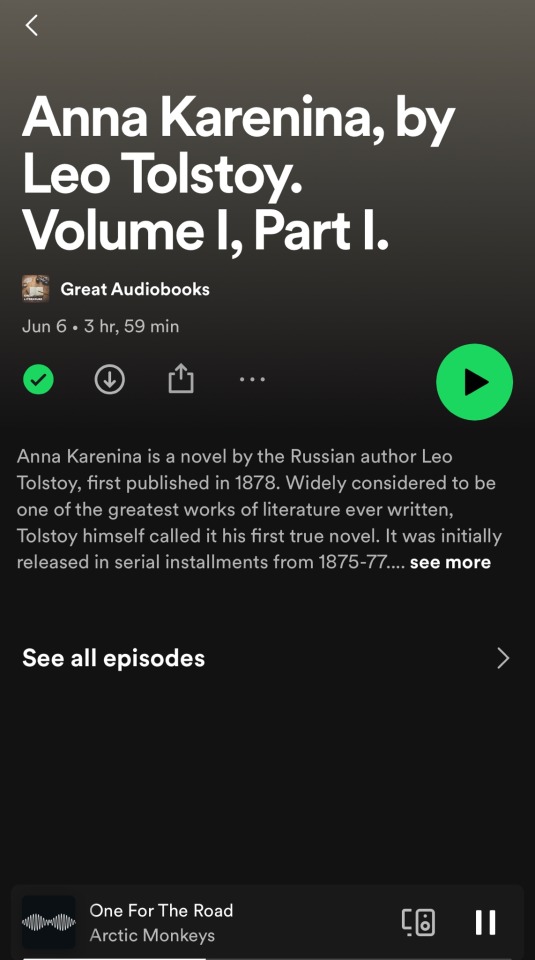

THIS IS CRAZY COOL!! With a student discount on spotify it’s literally 5 fucking dollars i’m such a nerd i’m geeking so hard over I SOUND LIKE AN AD I SWEAR I SHOULD BE PAID FOR MY DICKRIDING RN BUT MY ADHD LITERARY ASS IS SO EXCCITEDDD multitasking will be so fun now!!! idk just thought i’d share my excitement with the dash :D
P.S. THE RAVEN CYCLE IS TOP 5 “YA”-ISH LITERATURE
#raven cycle#trc#the raven cycle#the raven king#the raven boys#literature#college student#adhd brain#adhd#living with adhd#the nd urge to overshare#english major#world literature#audiobook#spotfiy
105 notes
·
View notes